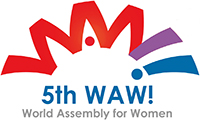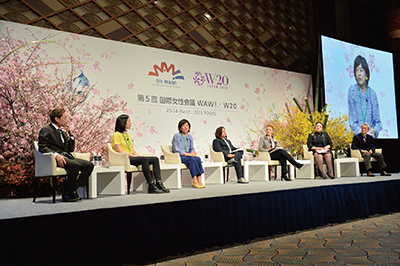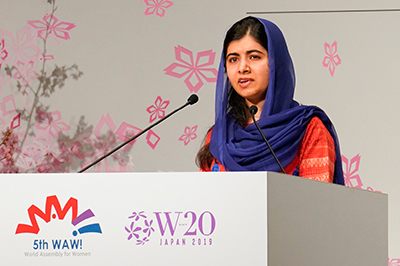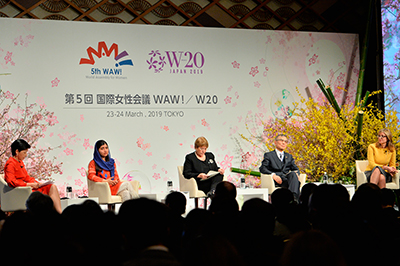Diplomatic Bluebook 2020
Chapter 3
Japan's Foreign Policy to Promote National and Global Interests
8 Women
(1) G7 Biarritz Summit
At the G7 Biarritz Summit in August, chaired by France, gender equality was discussed under the theme of “Fight Against Inequalities,” and “the Declaration on Gender Equality and Women's Empowerment” was adopted. During the Africa session, leaders discussed the promotion of female entrepreneurship in Africa and “Promoting Women's Entrepreneurship in Africa” was issued as an annex.
(2) G20 Osaka Summit
At the G20 Osaka Summit held in June, women's issues were raised as one of the major topics and a leaders' declaration was issued. The declaration noted such matters as promoting women's participation in the workplace and support for girls' education including improving access to STEM (science, technology, engineering, and mathematics), and included the importance of feedback from female business leaders, including women entrepreneurs. A Leaders' Special Event on Women's Empowerment was also held as an official side-event. There, G20 leaders and the heads of international organization reaffirmed their G20 commitments to women's empowerment.
(3) World Assembly for Women (WAW!)
Japan has held the World Assembly for Women (WAW!) since 2014 to communicate, both at home and abroad, Japan's initiatives for promoting women's empowerment, and to provide an opportunity for discussions regarding various matters concerning women by top leaders from Japan and abroad who are active in pioneering politics, economy, and social fields. The 5th WAW! was held in March 2019 side by side with the W20, one of the G20 engagement groups (groups composed of stakeholders from the international community that are independent of governments).

 Discussions held during the 5th World Assembly for Women (WAW!) (March 23, Tokyo)
Discussions held during the 5th World Assembly for Women (WAW!) (March 23, Tokyo)The theme of the 5th WAW! was “WAW! for Diversity,” and discussions were centered on women's viewpoints regarding current issues faced by modern Japanese society and the international community, under the recognition that it is important to incorporate diverse viewpoints toward realizing a sustainable, diverse, and inclusive society that “leaves no one behind,” which is stated in the Sustainable Development Goals (SDGs). Discussion topics included “Leadership for Regional Development and Job Creation,” “Media and Contents to Nurture Diversity,” “Women's Participation in Conflict Prevention, Peacebuilding, and Post Conflict Recovery,” “Diversity for Growth: Corporate Management and Working Environment,” and “Future of Family: Getting Support, Utilizing and Sharing” (see the Special Feature on page 233).
In addition, there were discussions at the W20 entitled “Closing the Gender Gap for New Prosperity: Enhancing Governance for Women's Empowerment,” “Creation of New Market Value by Women Entrepreneurs,” “Gender Lens Investing: Emerging Global Trends,” “Towards the Gender Equality in the Digital Era,” “Women as Patients and Caregivers: Improving Gender Equity and Labor Inclusion by Addressing Healthcare Disparities,” and “Closing the Gender Gaps at Work: Leading a Happy Work and Life.”
The 6th WAW! was scheduled to be held on April 3 and 4, 2020, but was postponed due to the circumstances surrounding the novel coronavirus disease (COVID-19).
The 5th World Assembly for Women (WAW!), organized by the Government of Japan, was held on March 23 and 24. Female foreign ministers from seven countries and 82 top leaders active in various fields from Japan, 27 countries and regions, and three international organizations took the podium. Approximately 3,000 people participated over the course of the two-day event. Based on the theme “WAW! for Diversity,” discussions were held on issues in Japan and abroad by participants with diverse backgrounds, including youths and male participants, with a view toward the realization of a sustainable, inclusive, and diverse society where no one is left behind, as established under the SDGs. The ideas and proposals presented by each participant were compiled in a summary document and registered as a UN document (No. A/73/861).
This Special Feature introduces the keynote speech presented by Ms. Malala Yousafzai, Nobel Peace Prize laureate, as well as the panel discussion “Human Resource Development in a Changing Society with Technology Transformation” that she participated in.
Keynote speech by Ms. Malala Yousafzai, Nobel Peace Prize laureate
 Ms. Malala Yousafzai, Nobel Peace Prize laureate (March 23, Tokyo)
Ms. Malala Yousafzai, Nobel Peace Prize laureate (March 23, Tokyo)In the keynote speech, Ms. Yousafzai spoke about her background in Pakistan, her home country where she was born and raised and where girls were not allowed to attend school, as well as why she decided to speak out at the age of 11, leading to her activities in the present day. On top of that, she pointed out that a life without education means it is shut off from the future, and deprived of its opportunity to contribute to society. She emphasized that the promotion of education for girls in the areas of science, technology, engineering, and mathematics (STEM subjects) can also contribute to technological innovation, and appealed to G20 and business leaders for further investment and support toward education for girls.
Panel discussion “Human Resource Development in a Changing Society with Technology Transformation”
 At the panel discussion (March 23, Tokyo)
At the panel discussion (March 23, Tokyo)At the panel discussion, the participants exchanged views on how to nurture human resources amidst the development of the IT industry, which has also been labelled as “the Fourth Industrial Revolution,” and how people can enjoy its benefits fairly without leaving anyone behind. Ms. Yousafzai pointed out that as many as one billion girls are being left out of the technological innovation, and called on governments and business leaders to provide support. Moreover, she appealed for the move toward a society where everyone can exercise their rights. She also expressed her joy at Prime Minister Abe's commitment to provide opportunities for quality education to at least 4 million girls in developing countries by 2020, and expressed her hopes for more of such initiatives from other countries. Other panelists presented concrete examples of initiatives that are being implemented by companies, universities, and as part of national policies. For example, Bulgaria achieved the highest number of female students becoming IT engineers, through cooperation from companies in the private sector. In addition, a member of a certain university introduced the university's activities to raise awareness among parents and guardians, with the aim of encouraging girls to further their studies in the STEM subjects under the recognition of the future need to develop human resources who have specialized knowledge in a dedicated field, as well as a broad spectrum of knowledge in other areas.
(4) International Cooperation for the Empowerment of Women in Developing Countries
In May 2016, Prime Minister Abe announced the “Development Strategy for Gender Equality and Women's Empowerment,” formulated as one of the new thematic policies under the Development Cooperation Charter, and declared that measures would be implemented to train about 5,000 female government administrative officials and to improve the learning environment for about 50,000 girls over the three years from 2016 to 2018. This was steadily implemented. At the 3rd WAW! held in December 2016, Prime Minister Abe promised to provide support amounting to more than 3 billion US dollars for women in developing countries until 2018, with a focus on the following: (1) promoting women's and girls' rights; (2) creating an enabling environment for women and girls to reach their full potential; and (3) advancing women's leadership in politics, economy, and other public fields. These measures were also steadily implemented. At the 5th WAW!, held in March 2019, Prime Minister Abe reaffirmed his pledge, which he announced at the G7 Charlevoix Summit, to provide high-quality education and career development opportunities to at least 4 million women and girls over the three years between 2018 and 2020 as a means to expand educational opportunities for women in developing countries.
(5) Initiatives in the UN
A United Nations Commission on the Status of Women
The 63rd session of the United Nations Commission on the Status of Women (CSW) was held in March. In attendance were Representative of Japan Tanaka Yumiko (Visiting Professor at Josai International University), as well as a representative group comprising members from Japan's ministries and agencies, the Japan International Cooperation Agency (JICA), and NGOs. The priority theme for discussions held at the session was “social protection systems, access to public services and sustainable infrastructure for gender equality and the empowerment of women and girls.” In a general debate, Representative Tanaka emphasized relevant efforts in Japan including ramping up support for childcare and caregiving, as well as efforts to combat sexual crime and sexual violence. She then introduced Japan's international contribution for better access to education and health services and more participation in economic activities for women and girls by providing safer and more comfortable public transportation. She also talked about Japan's ongoing efforts to promote universal health coverage and provide support in the field of education, one of the priorities for the Japanese G20 Presidency.
B UN Women
Japan is stepping up cooperation with UN Women. Along with increasing its contribution of approximately 2 million US dollars in 2013 to 17.9 million US dollars in 2019, Japan provides a range of support for primarily Middle Eastern countries such as Egypt, Jordan, and Turkey that are taking in refugees from Syria and Iraq, as well as conflict-stricken countries in Africa that include Nigeria, Niger, Chad, Mali, and South Sudan. This support consists of securing dedicated facilities for women according to the needs of female victims of sexual or gender-based violence, psychological and social support, and economic empowerment support that includes vocational training. To prevent violent extremism, Japan supports efforts to build resilient communities through women's empowerment, as well as efforts to encourage women's participation in broad-based peacebuilding and in the peace and reconciliation process in Lebanon and Sri Lanka.
C Dealing with Sexual Violence
Sexual violence is used as a tactic of war which cannot be overlooked. It is vital to put an end to impunity and to support victims of violence. Japan has been actively engaging in efforts to ensure that the 21st century is a world where women do not suffer violation of human rights. Japan places importance on cooperating with international organizations that include the UN Action and Office of the Special Representative of the Secretary-General on Sexual Violence in Conflict, as well as participating in international discussions.
In 2019, Japan provided financial support of approximately roughly 1.5 million US dollars to the Office of the Special Representative of the UN Secretary-General on Sexual Violence in Conflict, contributing to strengthening the police and judicial capabilities of Iraq, the Democratic Republic of the Congo, and Central Africa. Furthermore, Japan continues to make voluntary contributions to the Trust Fund for Victims of the International Criminal Court (ICC), earmarking approximately 600,000 Euros out of a cumulative contribution of about 800,000 Euros for victims of sexual violence. Efforts are also being made to protect victims of such violence.
D Women, Peace and Security (WPS)
Japan formulated a national action plan in 2015 to implement UN Security Council resolution 1325 and other related resolutions on women, peace, and security. In March 2019, Japan launched the revised second version of the plan. In accordance with the national action plan, Japan has contributed to advancing the WPS field in the Middle East, Africa, and Asia through various financial support to international organizations, mainly UN Women and the UN Office of the Special Representative of the Secretary-General on Sexual Violence in Conflict. Japan also compiles an annual report as monitoring and evaluation of implementation of the plan which is published on the website of the Ministry of Foreign Affairs. G7 Women, Peace and Security (WPS) Partnerships Initiative was established at the 2018 G7 Foreign Ministers Meeting in Toronto. With Sri Lanka as its partner country, Japan has supported the implementation of the WPS agenda including formulating a national action plan on the WPS of Sri Lanka beginning since 2019, as well as the economic empowerment project for female headed households, including conflict-affected widows.
E Committee on the Elimination of Discrimination against Women
Since 1987, Japan has continued to provide members for the Committee on the Elimination of Discrimination against Women (CEDAW), which comprises 23 independent experts. Professor Akizuki Hiroko of Asia University was elected to a member of the CEDAW at its member election held in 2018.

